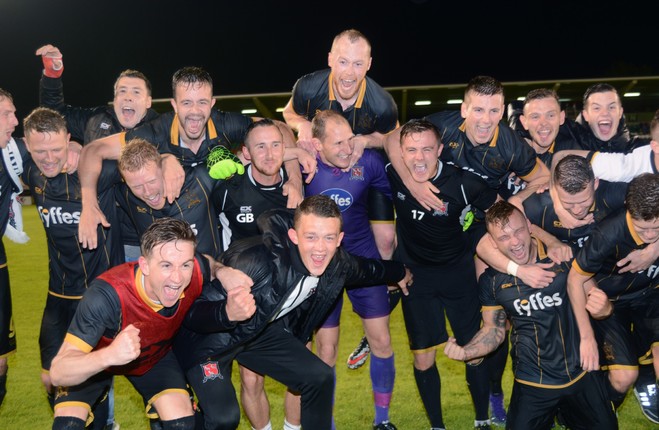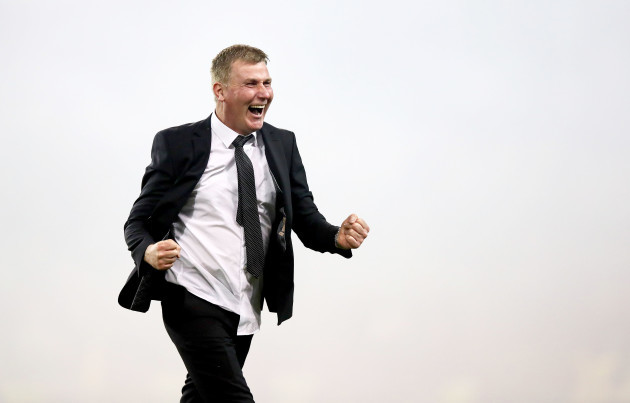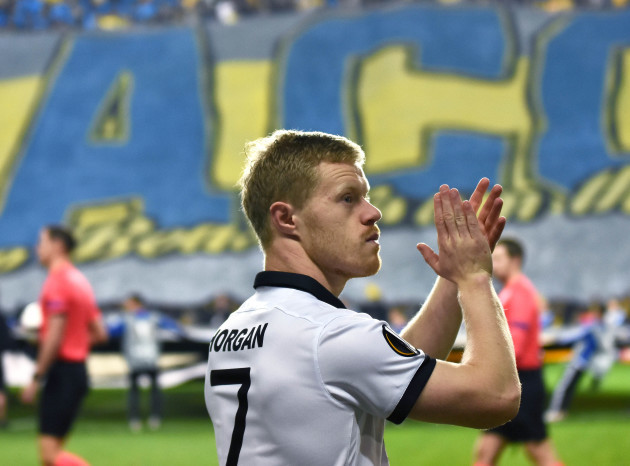THERE IS A growing sense that the perception of the League of Ireland has improved in recent years. Multiple managers and players have said as much in interviews.
Ireland U21 boss Stephen Kenny recently commented: “As someone who managed in the league for a long number of years — initially, when I started, you couldn’t get a game on TV, you didn’t have any interest, self-esteem was non-existent.”
There are a variety of reasons for domestic football’s subsequent increase in popularity. Improved playing standards, greater media coverage, the selection of players at international level for underage and (occasionally) senior level, and the increased marginalisation of Irish players in the Premier League are among the factors that have contributed to this considerable change.
But arguably most significant of all has been the progress made by the nation’s domestic sides in Europe, specifically two teams. Shamrock Rovers made the first big breakthrough in 2011, when they became the first Irish side ever to reach the group stages of the Europa League, courtesy of a stunning extra-time win over Partizan Belgrade.
Michael O’Neill’s men would go on to compete against clubs of the calibre of Tottenham and Rubin Kazan. Though they did not pick up a single point in what was a tough group that Spurs also failed to qualify from, it was still a significant moment in Irish football.
In 2016, Stephen Kenny’s Dundalk built on the foundations laid by the Hoops in memorable fashion. Their domestic dominance had been well and truly established at that stage, having won two League of Ireland titles on the bounce in addition to an FAI Cup. Europe felt like the next big challenge, though for a club with limited resources in comparison to those they came up against, not many observers would have anticipated what happened next.
First up on what turned out to be a historic run was a home game with Icelandic side FH. The outlook was not especially promising after the first leg. The hosts had taken the lead at Oriel Park in the second half through David McMillan, but Scottish attacker Steven Lennon drew the tie level on 77 minutes in what proved to be the game’s final goal.
The Lilywhites got off to a bad start in the second leg, as English forward Sam Hewson gave the home side the lead in Hafnarfjörður, but two goals from McMillan early in the second half turned the tie in the Irish team’s favour. Kristján Flóki Finnbogason’s goal 12 minutes from time ensured a tense finale, but the visitors held on to claim an away-goals victory.
We drew at home and it was sort of tinged with disappointment, because we dominated the game and I felt we were the better side,” McMillan tells The42. “We were going over there with the belief that we could see the job through but also knowing we should have won at home and made things easier for ourselves.
“Over there, they were a much better team. The first 20 minutes, they were doing really well and we just had to dig in. We went behind in that game and missed a penalty as well, so things were against us a little bit.
“We managed to get ourselves a couple of goals to sneak ourselves in front. It finished 2-2 and we had to hang on for the last few minutes. It was such a big relief, because if we went out, we would have been out [of Europe] altogether. It was just so crucial to get through that first round.”
Next came formidable opposition in the form of BATE Borisov. The Belarusian side had a very strong European pedigree. Not only were they dominant domestically, winning 10 league titles in a row prior to the Dundalk meeting, but they had also reached the Champions League group stages on five occasions, pitting their wits against sides such as Milan, Barcelona and Bayern Munich.
They had dumped Dundalk out in the qualifying round the previous season, and with top players such as ex-Arsenal midfielder Alexander Hleb within their ranks, most observers expected a similar outcome this time around.
The League of Ireland champions, however, had other plans. A goal from Belarus international Mikhail Gordeichuk earned his side a home first-leg win. Due to Oriel Park not meeting Uefa standards, the second leg was played at Tallaght Stadium, though in every other sense, it was a home tie for Dundalk, with a buoyant crowd cheering them on. Goals either side of half-time from McMillan put them in the driving seat, before a last-gasp Robbie Benson effort put the icing on the cake.
The win was a seismic moment in Irish football. It set up a play-off with Polish outfit Legia Warsaw and meant that the worst-case scenario for Dundalk would be reaching the Europa League group stages.
Three years on, one of the heroes of that night, McMillan, still considers it the “standout moment” from that entire campaign.
“We knew a little bit about each other. The year previously, we’d gone over there and performed really well. We lost the game 2-1, but put up a good showing. When we went over there the following year, we were beaten 1-0, but it was probably our worst performance for a long time in Europe. We hardly had a kick of the ball, we never kept it and it was so fortunate that we only lost 1-0. Even in the dressing room, the boys were a bit despondent, but the consensus was ‘it’s only 1-0′. We had belief we could turn it around, but they were so impressive that day.
We knew they had some incredible results in Europe, even in the group stage of the Champions League, but they had not won away from home, even when they knocked us out the previous year, it was 0-0 in Oriel. So we had a little bit of belief that they didn’t travel well. We believed we could overturn it and thankfully we did.
“It was a real high. [My two goals that night in Tallaght] came on a run of form for myself with the goals in the previous round and I was scoring in the league. It was just one of those runs you get in your career. It was an incredible evening. We had Tallaght packed out and performed to an incredibly high level.
“I think 3-0 didn’t flatter us on the night. Everything clicked. Whereas the week previous, nothing happened in terms of we couldn’t keep the ball, we couldn’t get going, we couldn’t get any rhythm. The game in Tallaght was the complete opposite. Everything just clicked. Even the [third] goal. A short pass, Robbie nicks in and scores. I think that just summed it up — everything went right.
“Even after the game, the atmosphere around the place, no one knew what to do with themselves really. We were all absolutely buzzing. Martin O’Neill was at the game and came into the dressing room and started speaking to us. I don’t think Stephen Kenny was in the dressing room at the time, he was speaking on Eir Sport. It was just delirium really. Everyone was joking around and just enjoying the occasion. It was such a big achievement.”
And does McMillan remember exactly what O’Neill said to the Dundalk players?
“He just congratulated everybody. He had a joke with Chris Shields about how well he was playing. It was great to see the Irish manager there congratulating us. It just showed what a good achievement it was.”
The Legia clash, meanwhile, was a case of so near yet so far. The tie appeared to be effectively all over after the first leg at the Aviva Stadium. There seemed to be little between the two teams initially. The match changed early in the second half though, when the visitors were awarded a penalty, after Andy Boyle was harshly penalised for handball in the box. Hungary international Nemanja Nikolić duly converted from the spot. Dundalk were then hit with a hammer blow in stoppage time, as a loss of concentration at the back saw Serbia international Aleksandar Prijović double his team’s advantage.
Dundalk didn’t give up though. In Warsaw, a stunning Robbie Benson volley got them back in the tie. Adam Hlousek’s dismissal on 67 minutes gave the Irish team further scope for optimism, but as they desperately pushed players forward in search of the pivotal second goal, Polish international Michal Kucharczyk sealed the tie against the run of play in second-half stoppage time.
We probably lost it in the home game in the Aviva,” remembers McMillan. “The first goal was an unbelievably harsh penalty. You see a few of them lately — it was a penalty decision where his hands are down by his sides. The guy he’s two yards away from kicks it into his hands and the penalty is given.
“We got done then with a sloppy piece of play in the last minute and ended up 2-0 down. Had we gone over 1-0 down considering how the away leg went, we would have been in a great position. But we were chasing a second goal at the end of that game in Legia and got done on the counter.
“The stadium was pretty much sold out, the fans were behind the goal with their huge flags and flares going off everywhere. It was an incredible atmosphere, something I’ve never really experienced before and something everyone involved in the game will remember very well.
“I’m sure Robbie has very fond memories of his goal, I was actually only watching it back today.
“I’m obviously disappointed we didn’t go through. If things had gone well for us, we could have beaten them, but in the end, we were probably beaten by a team that were just a little bit better than us.”
So while Dundalk’s Champions League journey came to an end, they still had the Europa League to look forward to. They got off to a brilliant start, drawing 1-1 with AZ and beating Maccabi Tel Aviv 1-0, with Ciaran Kilduff on target with late goals on both occasions. In the process, Dundalk surpassed the previous feats of Shamrock Rovers, as they became the first Irish side to pick up points in the group stages.
“Even the AZ game away from home, we had such belief in ourselves. We had performed to a very high level, so we were going over to AZ believing we could do well. I thought the first half an hour we were doing brilliantly. We were away to this top Dutch side and holding our own. I think they had a couple of chances, they hit the post, but in general play, unlike the BATE games, I don’t think we were up against it. What an occasion to even pick up a point there. Then the atmosphere in Tallaght [versus Maccabi], to get three points, it was an unbelievable start to the group and one I don’t think anyone expected us to get.”
Thereafter, there was a slight sense of anti-climax, as four consecutive losses saw McMillan and his team-mates fail to reach the next round.
It didn’t help matters that Dundalk were also chasing a domestic league and cup double (they succeeded in their pursuit of the former but were beaten by Cork in the final of the latter). A hectic fixture list stretched their squad to the limit, and McMillan acknowledges that tiredness may have affected their performances in Europe ultimately.
The AZ game at home was probably our most disappointing peformance where we didn’t really get to the level we had been. We lost 1-0 in the end, but it was probably coming at the time where we just had games every two or three days.
“I think the other games, even at home to Zenit, we were very unlucky to lose 2-1 — we hit the post to go 2-0 up and performed really well. Away to Zenit, we made it 1-1 and conceded late enough in the game to lose.
“All in all, we never lost a game by more than a goal in the group stages. When you consider the opposition we were up against, I think it was a credit to ourselves that we went so close. And it went right down to the last game. In the end, AZ won, which took it out of our hands, but we went into the last game thinking, if we could win here, there’s a good chance we could get through the group.
“But for any Irish team to get as far as we did is a massive achievement when you consider the budgets Dundalk have even in comparison to those teams we were up against.”
And for Dundalk’s players, it was in many ways a career-changing experience.
“Playing in front of those big crowds in the Aviva and Legia is just so different from playing in front of 4,000 or 5,000, which is about as high as it gets in the League of Ireland. It was so surreal. You saw the other side of being a footballer and being a footballer at that level. I’m 30 years of age now, I’ll never get to quite that level [again]. But for even the younger guys, it was something to aspire to. I’m sure everybody watching at home, other League of Ireland players or whatever, thought: ‘I’d love a slice of that.’ It was such a great experience. It just inspired you to keep working hard and see how far you can go in your career.”
A number of the Lilywhites also benefited enormously as individuals. Daryl Horgan and Andy Boyle signed for Preston and both got capped by Ireland. Stephen Kenny was confirmed as a future national team manager two years later. And McMillan himself got a move across the water to Scottish top-flight side St Johnstone. Without that remarkable European run, it is hard to imagine any of those things happening.
Irish football at large was also turned on its head as a result. With Dundalk capable of playing a positive and exciting brand of football against top-quality sides, people no longer were so accepting of the international team’s tendency to invariably play uninspired route-one football, and it’s no surprise that Kenny was ultimately earmarked as the man to help alter their style.
“It’s one thing playing and scoring in Ireland consistently, but I was able to show I could play and score in Europe against very good teams,” McMillan adds. “I’m sure people that were trying to sign me at the time thought: ‘That makes a big difference.’ I’ve no doubt that helped me indeed.
And whatever about myself, Andy Boyle and Daryl Horgan probably saw the best of that. They were brought into the Irish squads on the back of what they were doing at that level. I think it showed if you can compete against teams like Zenit St Petersburg and AZ Alkmar, you’re more than ready, whether it’s playing across the water or representing Ireland.”
Moreover, McMillan feels Dundalk’s current crop of players are more than capable of emulating their predecessors in every respect.
“[The Riga] game is a big one, but it’s a tough one and hopefully they can get through and show what good young talented players they have.”
The Lilywhites earned more than €6 million as a result of their European adventure, though it was recently reported that €2.2 million of that fund was held by the Football Association of Ireland for 11 months.
It is perhaps still too early to definitively say how wisely those funds have been invested, though McMillan believes the club are in a healthier position now compared with the beginning of 2016.
“I’m looking at it from afar at this stage, but they seem to have been able to add to the club. They’ve a very good gym there. They’ve good media facilities and things now. I know things are constantly on the up there. I’m sure they’d love to have a new stadium within time. Obviously, since that run, [the club has been bought by] new owners, who have their own ambitions. I think the money has been well spent. It’s helped the players. They’ve better facilities now.
“Thankfully, the club have been able to stay at the top for a number of years, which isn’t always easy in the League of Ireland, but I think they’ve managed to build on it slowly but surely. Hopefully, with a bit more success this year, they’ll be able to keep going and pushing on in that regard.
It’s obviously more difficult [in Europe now]. There’s an extra round to get through to get to the stage we were at. But I think the Dundalk team that’s there at the moment is as strong as any. They’ve probably got a bigger squad, more options available to them.
“But it’s all about trying to get through that first round. That’s all they can focus on at the moment. They’re in a strong position in terms of the league, so they can go try to go all out and see how far they get.”
The42 is on Instagram! Tap the button below on your phone to follow us!



